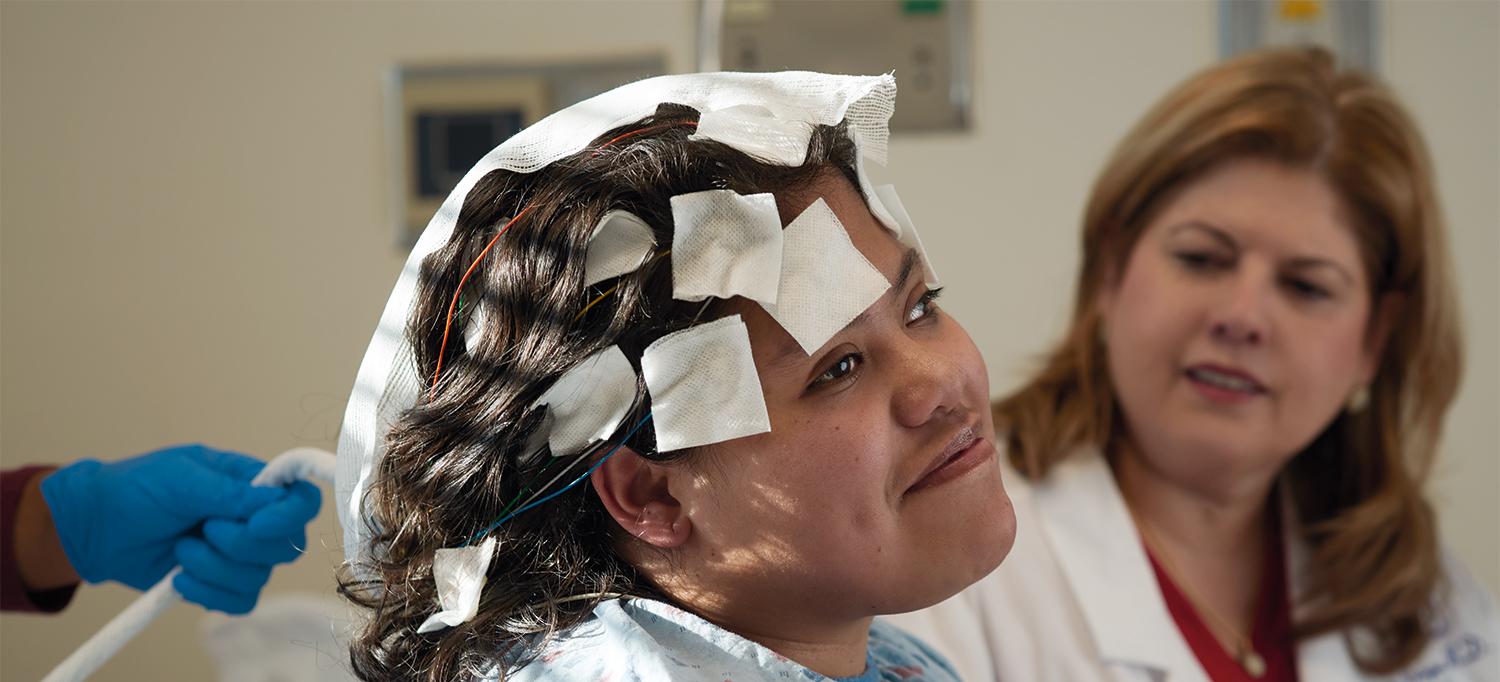A Dedicated Epilepsy Unit Opens at NYU Langone Hospital—Brooklyn, Bringing NYU Langone Health’s International Expertise to a Community in Need

In the new Epilepsy Unit of NYU Langone Hospital–Brooklyn, Dr. Blanca Vazquez monitors one of her patients for signs of seizures.
Photo: Sasha Nialla
Each year, nearly 600 people are brought to the Emergency Department at NYU Langone Hospital—Brooklyn in the throes or aftermath of a seizure. But only two-thirds of these patients are eventually diagnosed with epilepsy, a complex brain disorder characterized by sudden, often unpredictable seizures.
“Knowing whether a person is actually having a seizure and diagnosing the type of seizure can be difficult,” notes Nicholas Gavin, MD, chief of service for the Emergency Department at NYU Langone Hospital—Brooklyn. “There are many disorders that can cause changes in behavior and be mistaken for epilepsy. In the emergency department, our biggest challenge is when we learn that the patient lost consciousness and exhibited abnormal movements, but has never been diagnosed with epilepsy.”
When the pieces don’t quite fit together, Dr. Gavin explains, it’s time to call in an epileptologist, a neurologist who specializes in epilepsy. NYU Langone Hospital—Brooklyn’s emergency department is now able to tap the expertise of 3 such experts, who are on call 24/7 to help diagnose and treat the most mysterious or complex cases. They belong to the hospital’s first dedicated epilepsy unit, an eight-bed facility that opened last August.
Epilepsy is a spectrum of disorders that have in common a kind of electrical storm within the brain. The fourth most common neurological disease, it afflicts more than 3 million Americans, and its most severe forms claim the lives of thousands each year.
Any person can develop seizures at any age, though the onset is highest among children and the elderly. A seizure typically involves uncontrolled shaking, which can last for a few seconds or several minutes, but in many cases, there are no overt signs.
“Many things can trigger seizures, including fever, alcohol withdrawal, or sleep deprivation,” says Blanca Vazquez, MD, director of epilepsy clinical trials in NYU Langone Health’s Department of Neurology and head of the epilepsy program at NYU Langone Hospital— Brooklyn. But in more than 60 percent of cases, the cause is never determined.
The new epilepsy unit is designed to get answers quickly. It’s equipped with state-of-the-art audio–video technology and electroencephalograms (EEGs), which record the electrical activity in the brain. By evaluating the patient’s behavior and EEG results at the same time, clinicians can determine whether epilepsy should be ruled in or out.
“There’s an urgency to make the right diagnosis and prescribe the right medication,” says Dr. Vazquez. “Electrical activity creates a highway for more of the same, resulting in additional seizures. The more seizures patients experience, the more likely they will become treatment resistant.”
Within the safety of the monitoring unit, doctors may try to provoke a seizure by lowering the dosage of the patient’s medication or withdrawing it. “Some people have been treated for seizures for many years, but when we monitor them, we find that 25 percent don’t have epilepsy after all,” reports Dr. Vazquez.
When a diagnosis of epilepsy is confirmed, identifying the type of seizure is critical. Partial seizures begin with an abnormal electrical discharge restricted to one small region of the brain, while generalized seizures begin with a widespread, excessive electrical discharge involving both hemispheres. “The medicines used to treat partial seizures actually aggravate generalized ones,” Dr. Vazquez explains, “so you really have to know which type you’re dealing with.”
In severe cases, when medications fail and a surgical intervention may be required, patients can be transferred to NYU Langone’s Comprehensive Epilepsy Center at Tisch Hospital in Manhattan, where a renowned team of clinicians and researchers treats patients from around the world with complex conditions.
“We’re fully integrated with the Comprehensive Epilepsy Center at the main campus,” notes Jennifer A. Frontera, MD, chief of neurology at NYU Langone Hospital—Brooklyn, “and being affiliated with such a powerhouse program is a huge win for the Brooklyn community.”
For the great majority of patients who can be treated at NYU Langone Hospital—Brooklyn, Dr. Vazquez notes that being able to access such specialized care close to home is not only more convenient, but safer.
Some patients with epilepsy are not allowed to drive, and public transportation can be risky for someone who can suddenly have a seizure at any moment. “Having a resource like this where patients can be near their families and we can maintain continuity of care is a huge asset,” she says. “Good access translates into better compliance to medication, and that translates into fewer ED visits.”

